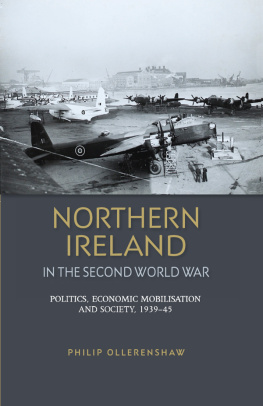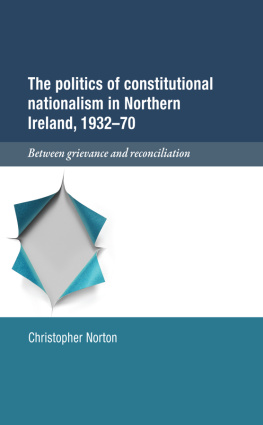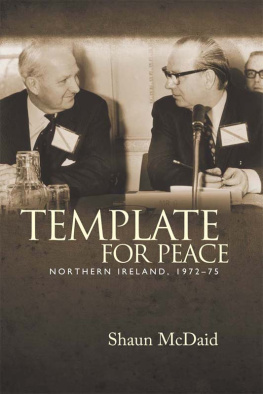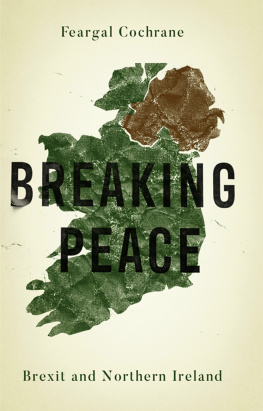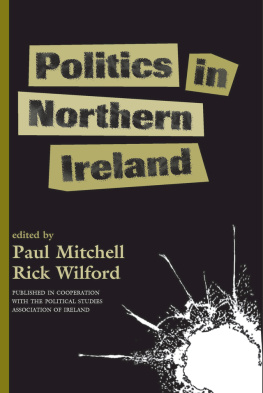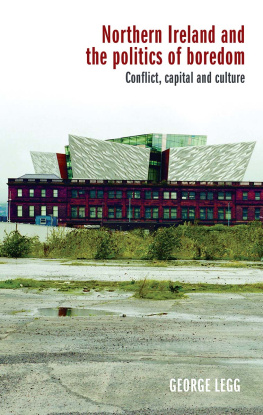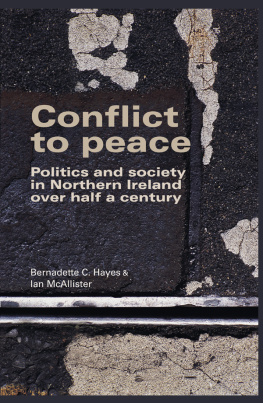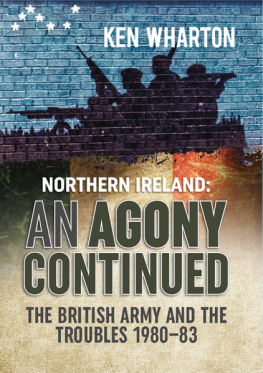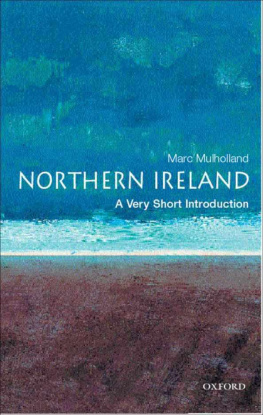Northern Ireland in the Second World War
For Hilary, Jennifer and Linda
Northern Ireland in the Second World War
Politics, economic mobilisation and society, 193945
Philip Ollerenshaw
Manchester University Press
Manchester and New York
distributed in the United States exclusively by Palgrave Macmillan
Copyright Philip Ollerenshaw 2013
The right of Philip Ollerenshaw to be identified as the author of this work has been asserted by him in accordance with the Copyright, Designs and Patents Act 1988.
Published by Manchester University Press
Oxford Road, Manchester M13 9NR, UK
and Room 400, 175 Fifth Avenue, New York, NY 10010, USA
www.manchesteruniversitypress.co.uk
Distributed in the United States exclusively by
Palgrave Macmillan, 175 Fifth Avenue, New York,
NY 10010, USA
Distributed in Canada exclusively by
UBC Press, University of British Columbia, 2029 West Mall,
Vancouver, BC, Canada V6T 1Z2
British Library Cataloguing-in-Publication Data
A catalogue record for this book is available from the British Library Library of Congress Cataloging-in-Publication Data applied for
ISBN 978 0 7190 9050 9 hardback
First published 2013
The publisher has no responsibility for the persistence or accuracy of URLs for any external or third-party internet websites referred to in this book, and does not guarantee that any content on such websites is, or will remain, accurate or appropriate.
Typeset
by SPi Publisher Services, Pondicherry, India
Contents
Research for this book has been undertaken over many years and I am most grateful to those archivists and librarians without whom none of it would have been possible. Staff at the Public Record Office of Northern Ireland were extremely helpful along the way, not least in opening up formerly closed files. For permission to use certain files, I acknowledge with thanks the Deputy Keeper of the Records at the Public Record Office of Northern Ireland, the Ulster Unionist Party, Viscount Brookeborough and Viscount Craigavon. For assistance with copyright clearance, I am indebted to Bethany Sinclair and Ian Montgomery.
Thanks are also due to the Bodleian Library for access to the Macmillan Papers, and the West Yorkshire Archives Service for access to the papers of Fairbairn Lawson Combe Barbour Ltd. I must also acknowledge the assistance of the staff at the Linen Hall Library in Belfast.
Papers given at the University of Ulster at Coleraine, the Queens University of Belfast, the University of Leeds and the University of Toronto helped to clarify some ideas and qualify others. In addition, a number of individuals have contributed helpful ideas, encouragement and criticism at various stages as the research progressed. These include Raingard Esser, Kent Fedorowich, John Fisher, David Harkness, Keith Jeffery, Liam Kennedy, Glyn Stone and Penny Summerfield. Glyn Stone cast his eye over several chapters and saved me from a number of errors. The two anonymous reviewers appointed by Manchester University Press offered much appreciated encouragement and constructive criticism. The University of the West of England, Bristol, granted me a terms research leave during the year 20078 which helped me to gather archival material. I am also grateful to Maura Pringle who drew the map.
My wife Hilary and our daughters Jennifer and Linda have lived with the book from the outset. They have been supportive, patient and encouraging, and I could not have asked for more. The book is dedicated to them.
AEU | Amalgamated Engineering Union |
APL | Anti-Partition League |
ARP | Air Raid Precautions |
ILP | Independent Labour Party |
IPLMA | Irish Power Loom Manufacturers Association |
IRA | Irish Republican Army |
JUC | Junior Unionist Committee |
NCCL | National Council for Civil Liberties |
NILP | Northern Ireland Labour Party |
NSC | National Service Committee |
NSRO | National Service Regional Office |
PRONI | Public Record Office of Northern Ireland |
ROF | Royal Ordnance Factory |
RUC | Royal Ulster Constabulary |
SCWO | Standing Committee of Womens Organisations |
TNA | The National Archives (Kew, London) |
UFU | Ulster Farmers Union |
UIDA | Ulster Industries Development Association |
UUC | Ulster Unionist Council |
UWUC | Ulster Womens Unionist Council |
Map of Northern Ireland
This book adopts a regional perspective on the economic, political and social impact of the Second World War. It focuses on Northern Ireland, a region in north-west Europe and part of the United Kingdom, and sets the experience of this region in a wider context. Northern Ireland was one element of the UK war economy, and its geographical position gave it a key importance in the battle of the Atlantic and as a bridgehead for large numbers of North American troops prior to the invasion of Europe in 1944. It was the only part of the UK with a devolved government, and this complicated the relationship between the region and decision-making in London. Northern Ireland was also the only part of the UK where there was no military conscription, no general industrial conscription and no policy of concentrating industry to make maximum use of labour and factory space. All this had major consequences for the experience of its workers between 1939 and 1945, particularly the dilution of skilled labour and the employment of women. Devolution and distance from London worked against economic mobilisation and, together with the absence of conscription, meant that Northern Ireland never sustained full employment during the war.
If Northern Ireland was distinctive in the above ways, it was also different from the rest of the UK because of its internal political divisions. Some two-thirds of the population was Protestant and generally supportive of full political union with Britain; a third was Catholic, generally nationalist, in favour of a united Ireland and an end to partition. Unsurprisingly, the divisions within society had profound implications for politics, policing and internal security. Support for the war could not be taken for granted and active, even violent, opposition from republicans was always possible. Of course in Britain there were those who opposed the war from the earliest stages. In Scotland, for example, opposition came from the Independent Labour Party (ILP) under James Maxton, from a majority in the Scottish National Party and (until June 1941) from the Communist Party. It would be hard to argue this for Northern Ireland, although after German invasion of the Soviet Union the Communist Party leadership did become strong supporters of economic mobilisation in the struggle against fascism. All this suggests that Northern Ireland was very far from being a typical UK region in the war, but even in Britain the range of wartime experience was so broad that the concept of a typical region has little meaning.

